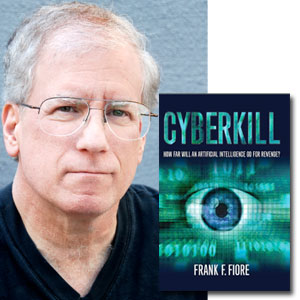 In Episode 10, best-selling author Frank Fiore and I chat about his novel, Cyberkill. During the conversation we tackle such questions as: Can artificial intelligence become self aware? If it did become self aware, would it be more analytical like Spock or emotional like McCoy? What does it mean to be human? Can you improve humankind by removing all the negative traits? Could a “perfect being” ever exist in the physical plane?
In Episode 10, best-selling author Frank Fiore and I chat about his novel, Cyberkill. During the conversation we tackle such questions as: Can artificial intelligence become self aware? If it did become self aware, would it be more analytical like Spock or emotional like McCoy? What does it mean to be human? Can you improve humankind by removing all the negative traits? Could a “perfect being” ever exist in the physical plane?
To help defray the cost of hosting the podcast, archived episodes greater than four months old will be made available for sale at $0.99 per episode.
Duration: 28:47
File Size: 33 MB
You can listen to a snippet here: www.youtube.com/watch?v=2xoYJoU6iD0
Mentioned in this Episode:
The Second Self: Computers and the Human Spirit by Sherry Turkle
The Three Laws of Robotics, developed by Isaac Asimov for his robot stories, are mentioned in this episode of The Genre Traveler Podcast. For those who may not be familiar with what they are, here you go:
1. A robot may not injure a human being or, through inaction, allow a human being to come to harm.
2. A robot must obey any orders given to it by human beings, except where such orders would conflict with the First Law.
3. A robot must protect its own existence as long as such protection does not conflict with the First or Second Law.
The short story I mentioned whose author I couldn’t remember is “Bears Discover Fire.” Written by Terry Bisson, it won the Hugo Award for Best Short Story in 1991 and the Nebula Award for Best Short Story in 1990, among other awards listed here. It was originally published in Isaac Asimov’s Science Fiction Magazine, Vol. 14, no. 8 (August 1990).
For more information about Frank Fiore:
- trapdoorbooks.com – to buy the book
- frankfiore.com – Frank’s main site
- frankfiore.wordpress.com – Frank’s blog
For previous episodes, go here.
Cyberkill is available in both paperback and Kindle editions:
Related Posts:
